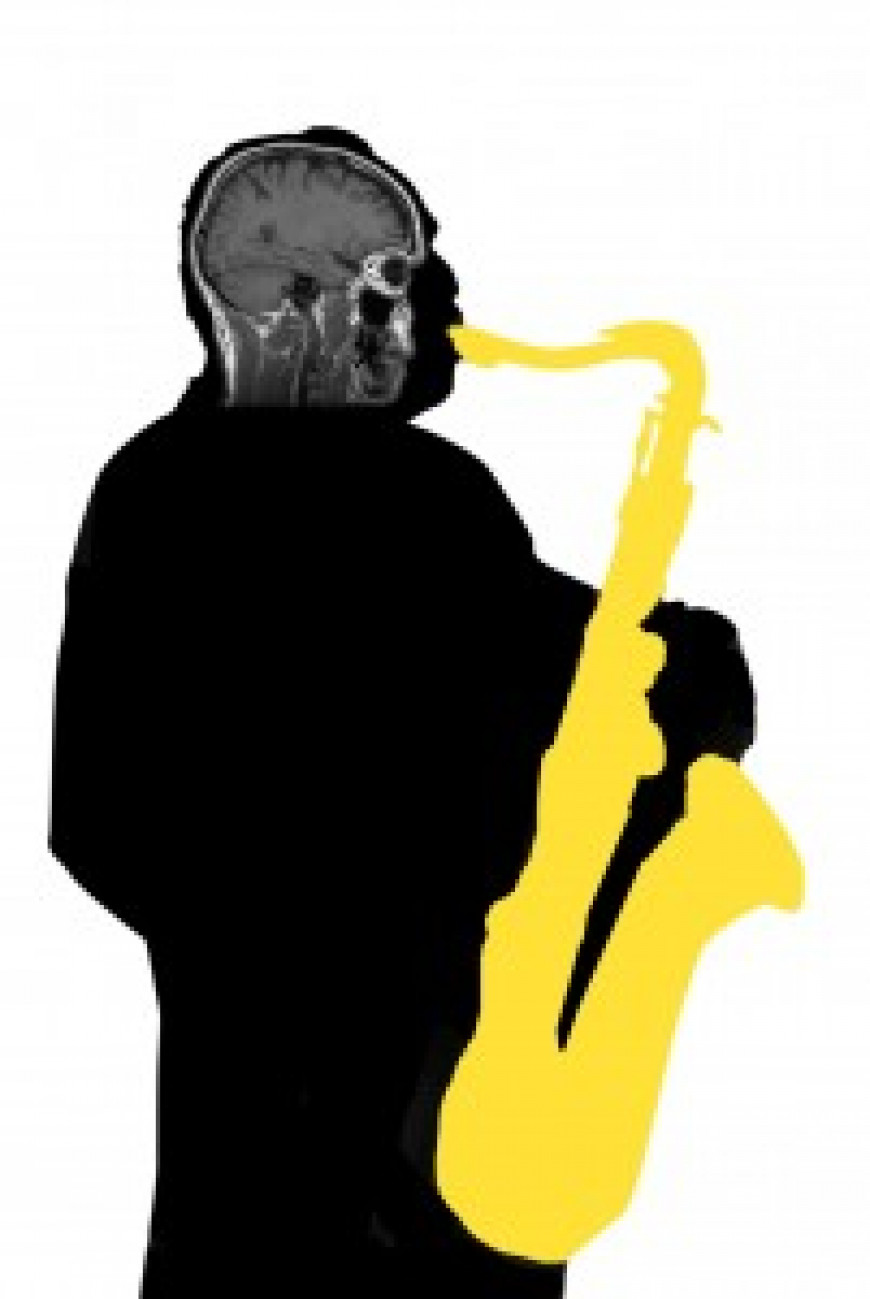The Perks of Being a Musician: Brain Function and Music Education

This Labor Day, celebrate by nurturing your creative side. Book lessons totalling $200 or more by Wednesday and take $20 off by using the code musical20 at the checkout. Or, book $100-200 in lessons and take $10 off with the code musical10. Offer good for bookings made on or before Wednesday, September 9, 2015, and cannot be combined with other offers.
As a reminder, in case you need one, this article by one of our fantastic summer interns from 2012 covers how good it is for children and adults to learn to play music.
By Abhik Jolly | August 30, 2012
There is no doubt that musicians are some of the most interesting people in our culture (I would cite Lady Gaga, rapper Danny Brown, Madonna, and David Bowie as some present and past examples, but the list could go on). Studies have also found a broad correlation between intelligence and musical aptitude. As if you needed more reasons to learn an instrument, this article will explore some of science’s discoveries on the subject of the benefits of music lessons.
This topic is also significant as more and more arts programs are cut in schools around the United States due to economic restrictions. The benefits of music education underscore the importance of keeping these programs in school curricula.
The Mozart Effect: The Brain and Music
The Mozart Effect was an early discovery in the relationship between music and brain function. The name came from the way the experiment was conducted: participants listened to Mozart before taking different tests. Studies found that participants performed better on tests of spatial ability, processing speed, and creativity after listening to Mozart and other music than participants who sat in silence or followed relaxation instructions.
This experiment is obviously a superficial application of music compared to music lessons. When studying music, one does much more than passively listen; one engages with the music in an analytic fashion. The example of the Mozart Effect serves simply to illustrate the way that music can stimulate the brain.
Students of Music Smarter and More Talented? The Research Says “Yes”
Some areas that favor people who have taken music lessons:
- Ability to detect speech in noise
- Being a "team player"
- General intelligence (on IQ and other intelligence tests)
- Grades in school (correlated even to high school GPA [take note, parents!])
- Hand-eye coordination
- Language memory (remembering prose or lists of words)
- Linguistic comprehension, including processing of second or foreign languages
- Math ability
- Phonological awareness (detection of pitch)
- Reaction time
- Reading comprehension
- Self-esteem
- Short-term memory
- Sociability
- Visual memory
- Vocabulary
- Working memory
Third Variables Challenge Conclusions of Research
But this might all seem suspiciously straightforward. Well, it did to scientists anyway. In this kind of research, a common pitfall is the “third variable.” This term means that in what might appear at first as a causal relationship, another variable is actually what underlies the seeming correlation.
In our case, scientists have hypothesized that people with inborn musical talents are likely to take music lessons for longer, and those people are also naturally more talented in other regards. This offers a possible explanation for why people who have taken music lessons display so many strengths when compared to others.
Another third variable to consider is economic standing. Families who can afford music lessons can likely afford other resources that provide an edge. Determining what is actually in play here demands more rigorous study conditions than simply comparing those who have taken music lessons in the past to those who have not.
Studies to Rule out Third Variables
One study focused on two different US elementary schools. The researchers tried to find schools that were as similar as possible to decrease the potential effect of third variables. The main difference was that one school’s curriculum included a mandatory music course that progressively increased in complexity.
When tested at the outset, the control group and the music group showed no significant differences on tests of reading comprehension. But as the study progressed, the music students began to outperform the non-music students, particularly in vocabulary and verbal sequencing, cornerstones of literacy.
The margin between the two groups widened as the months went on. The positive correlation held even when the researchers used the data from students of the same economic class, ruling out economic standing as a third variable.
This study gave fairly solid evidence that music lessons improve performance in other areas. Another study focused mainly on adults who had varying amounts of music instruction from very little or none to several years. These participants, grouped according to the duration of their music lessons, were tested on various listening tasks.
The findings were that those who had had even just a little bit of music instruction were able to process test sounds in much more thorough and subtle ways. As the number of months and years that participants had taken music lessons increased, so did their ability to process complex sounds.
Past music students were much more apt at extracting the fundamental frequency from a test sound. The fundamental frequency is the lowest pitch in a noise, and as it turns out, this ability is extremely important for perceiving speech in any language. Children learning a second language or with learning disabilities could benefit from music instruction for this reason.
As someone who has casually taken a number of years of music instruction myself in guitar, saxophone, flute, and music theory, I feel that my own experiences with music have aided my experiences with language.
As a French student of several years, I often approached my listening exercises the way that I would a song I want to learn, picking out and breaking down particular sounds and rhythms. Music experience also helped me to assimilate accents (though you might not think of the French accent as musical).
And as an audiophile, I feel that my personal enjoyment, appreciation, and understanding of music have all been enhanced. My friends marvel at my ability to sing pitch-perfect (though typically in falsetto!) along with almost any song. I think that I hear the world around me with a sharp clarity that I hopefully won’t lose from going to too many loud concerts in New York (perhaps I should invest in some earplugs).
One last thing to emphasize is that there is no evidence that studying music alone increases one’s general intelligence. The above research tends to focus on students who take music in addition to their other work. The clear conclusion is that music studies improve types of brain function that still must be applied to other things and developed.
So as a final note, study hard in addition to your work with music rather than instead of it! To parents, for your children, put an instrument in one hand and a book in the other (and maybe a cleat on one foot). Point being, the best-rounded education will foster the widest base of talents in your child. And feed them vegetables too!
Other Sources and Further Reading:
Music and Mathematics: Modest Support for the Oft-Claimed Relationship
Even A Few Years Of Music Training Benefits The Brain
Examining the association between music lessons and intelligence
Music Lessons, Emotional Intelligence, and IQ
Related:
- How To Make Time To Practice Your Instrument
- Q&A: How do you stay motivated and disciplined to practice?
- Our complete hand-picked list of music teachers
